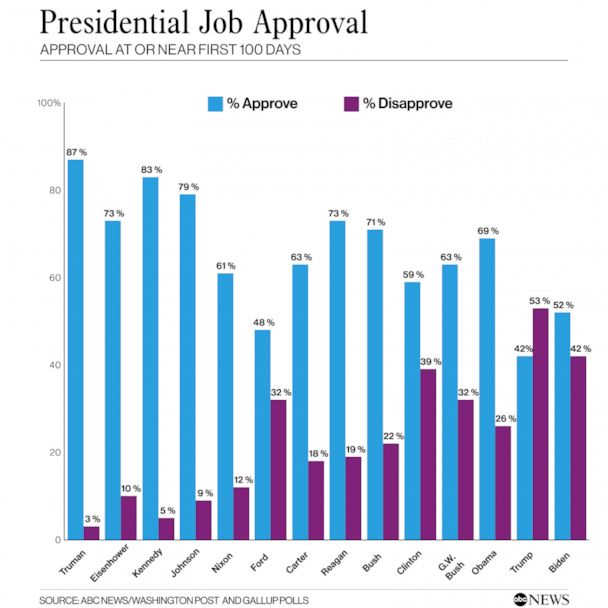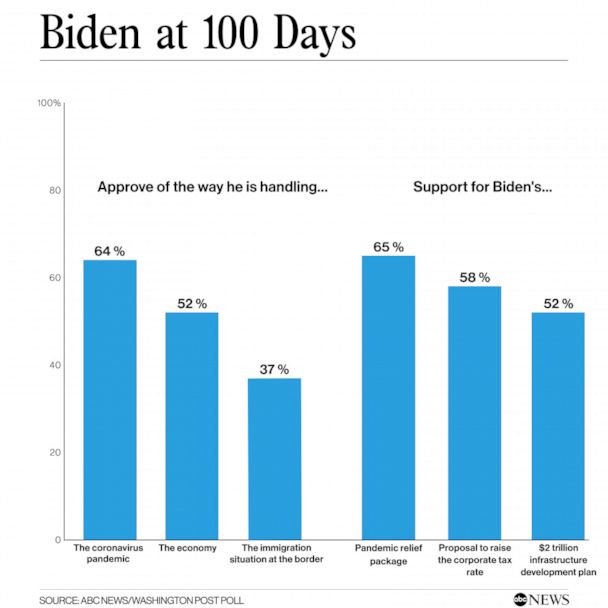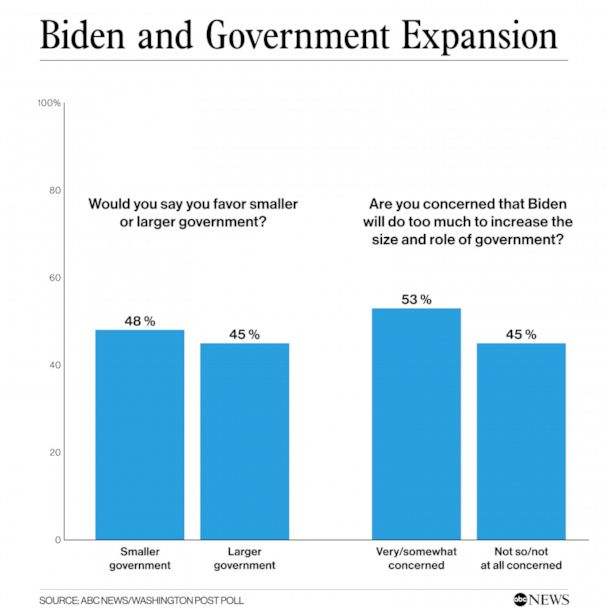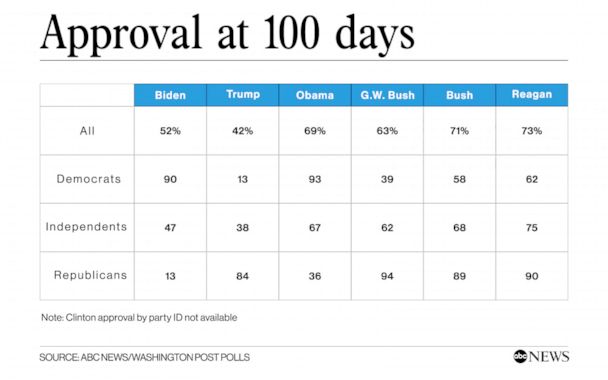Biden's 100 days: Low-end approval, yet strong marks on pandemic response: POLL
His April approval is lower than most of his predecessors, save Trump and Ford.
Intense partisanship is holding Joe Biden to a tepid job approval rating -- the third-lowest for any president at 100 days in office since Harry Truman -- along with continued economic dislocation, pandemic impacts and questions about Biden's view of the size and role of government.
All told, 52% of Americans in the latest ABC News/Washington Post poll approve of Biden's work in office, lower than any president at 100 days in office since 1945, save Gerald Ford in 1974 (48%, after his unpopular pardon of Richard Nixon) and Donald Trump at 42% in 2017. For the 14 presidents from Truman to Biden, the 100-day average is 66%.
See PDF for full results, charts and tables.

Behind Biden's overall rating is a range of varying assessments in this poll, produced for ABC News by Langer Research Associates. The president wins broad approval for his pandemic relief package, 65%; for his handling of the pandemic, 64%; and for his proposal to raise corporate taxes, 58%. But support for his $2 trillion infrastructure package slips to 52%, as does his rating for handling the economy; and he has just 37% approval for his work on the immigration situation at the U.S.-Mexico border.

More broadly, 53% express concern that Biden will do too much to increase the size and role of government in U.S. society. Relatedly, 40% see him as "too liberal," more than either of his most recent Democratic predecessors at 100 days – Barack Obama, 33%, and Bill Clinton, 26%. (This rose for Obama later in his presidency.)

At the same time, public preference for smaller government with fewer services, at 48%, is its lowest in ABC/Post polls dating back nearly 30 years. Virtually as many, 45%, now favor larger government with more services -- an opening, if not broad endorsement, for Biden's call for a greater role for government in addressing social ills.
Overall, preference for larger government with more services is up 7 percentage points since last asked in August 2012, driven by increases among Democrats (+17 points), college graduates (+17), liberals (+15) and men (+8). It's essentially unchanged among their counterparts.
Notably, too, while Biden's overall rating lags in historical terms, it surpasses his immediate predecessor. Trump, the first president on record never to achieve majority approval, left office with a 38% job approval rating, 14 points below Biden's today. Trump had the same 38% approval for his handling of the coronavirus -- 26 points below Biden's now.
By contrast, Biden's rating for handling the economy is essentially the same as Trump's in January, marking this as a clear challenge. Indeed, just 42% of Americans rate the economy positively, far below its pre-pandemic level; 58% instead say it's in not-so-good or poor shape. Presidential fortunes often are closely linked to economic conditions.
Partisans
The intensified partisanship of recent years is a factor in Biden's overall rating. Just 13% of Republicans approve of his work in office, exactly matching Democrats' approval of Trump at 100 days. Obama instead had 36% approval from Republicans in April 2009, and George W. Bush had 39% approval from Democrats at his 100-day mark.
Going further back, George H.W. Bush had 58% approval from Democrats in 1989, and Ronald Reagan had 62% Democratic approval at about 100 days in April 1981 -- levels of initial opposite-party appeal that seem a relic of the past.

Independents, most of whom lean toward one of the two parties, look different as well. In earlier years, sizable majorities of independents approved of the new president at 100 days -- 75% for Reagan, for example, and 67% as recently as Obama. Today, 47% of independents approve of Biden's work -- better than Trump's 38% at the same point, but far from what previous presidents have seen.
Negotiate?
Another result points to a conundrum for Biden -- whether and how to seek compromise with minority-party Republicans in Congress. On one hand, Americans often express support for bipartisanship, and such is the case now: Sixty percent prefer to see Biden try to win Republican support by making major changes to his proposals, while just 30% prefer he try to have his proposals enacted without major changes, even if that means no GOP support.
Political life, though, is not that simple. Despite that public preference, it likely won't be lost on the Biden administration that his most popular initiative -- the pandemic relief package -- is one he pushed through without a single Republican vote.
That said, even those who see Biden's views on the issues as "just about right" (rather than too liberal or too conservative) split on the matter of negotiation: Forty-four percent think he should compromise in the spirit of bipartisanship; 45% think he should enact his proposals without Republican support.
Approval groups
Biden's approval peaks among those who were most apt to support him in the presidential election: Democrats (90%), liberals (86%) and Black people (82%). It's 12 points higher among college graduates than those without college degrees (60% versus 48%), and 8 points higher among women than men (56% versus 48%), again reflecting familiar patterns from November.
Methodology
This ABC News/Washington Post poll was conducted by landline and cellular telephone April 18 to 21, 2021, in English and Spanish, among a random national sample of 1,007 adults. Results have a margin of sampling error of 3.5 percentage points, including the design effect. Partisan divisions are 33%-24%-35%, Democrats-Republicans-independents.
The survey was produced for ABC News by Langer Research Associates of New York with sampling and data collection by Abt Associates of Rockville, Maryland. See details on the survey's methodology here.